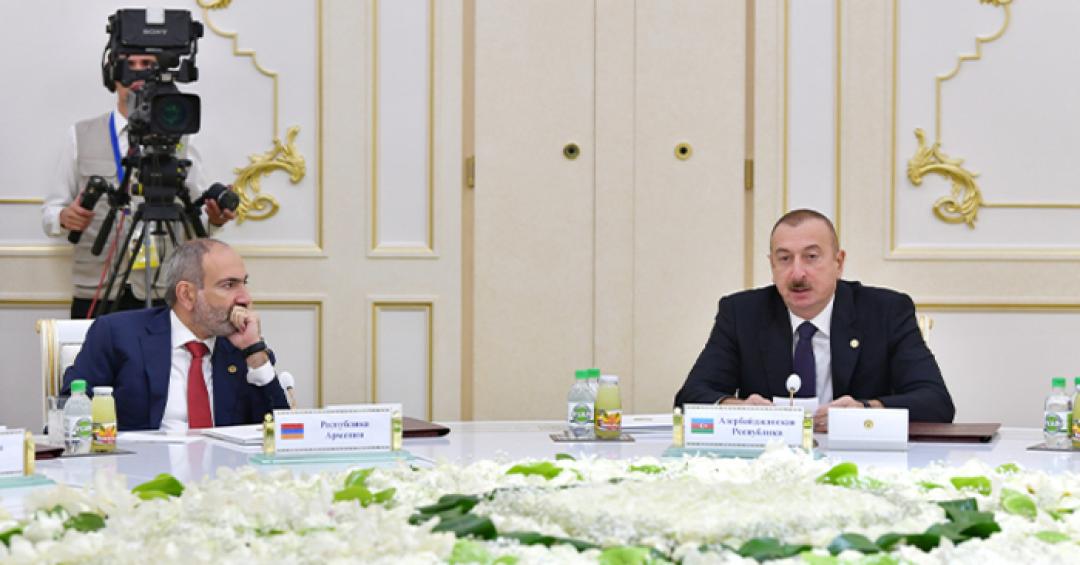
Aliyev: “Armenia accepted Azerbaijan’s proposals for normalisation process”

Armenia has adopted five principles proposed by Azerbaijan for the establishment of interstate relations. The statement came from Azerbaijani President Ilham Aliyev during a telephone conversation with Russian President Vladimir Putin on April 9.
During the conversation, the sides exchanged views on the normalisation of relations between Armenia and Azerbaijan in the post-conflict period and the meeting held in Brussels on April 6. Aliyev recalled the document submitted by Azerbaijan on five principles for establishing interstate relations with Armenia, and the Armenian side accepted these principles.
“The security guarantees of the people of Nagorno-Karabakh, the protection of their rights and freedoms, as well as the clarification of the final status of Nagorno-Karabakh are of principled importance for the Armenian side,” Armenia’s Prime Minister Nikol Pashinyan recently said at a Cabinet meeting. He stated these issues are included in the responses of the Armenian side relating to the peace agenda and must become a subject of negotiations. “Based on the meeting results, decision about two issues was achieved,” he added, presenting the results of his April 6 meeting with Azerbaijani President Ilham Aliyev in Brussels, mediated by the President of the European Council Charles Michel. “Firstly, the foreign ministers of the two countries were tasked to start the preparations for the future peace treaty and initiate talks and contacts on this direction. This means that the principles and matters presented by Armenia and Azerbaijan over the peace treaty must be finalised and must be addressed with the results of negotiations,” Pashinyan stressed.
He emphasised that the Armenian side has maintained that there is nothing in Azerbaijan's proposals that it finds objectionable. "However, they fall short of completing the peace agenda's tasks. Security guarantees for the people of Nagorno-Karabakh, as well as the safeguarding of their rights and freedoms, as well as the clarification of Nagorno-Karabakh's final status, are of paramount concern to us. These concerns are part of our replies to the peace agenda, and they must become a topic of discussion," Pashinyan emphasised. He underscored that like in the past, the Armenian side considers the engagement of the OSCE Minsk Group Co-Chairmanship vital in this process and stressed that it is necessary to continue working in this direction.
Earlier, Azerbaijani Foreign Minister Jeyhun Bayramov stated that Azerbaijan has sent a document consisting of 5 articles to Armenia on the normalisation of relations and is waiting for a response. Noting that the proposal was sent recently, Bayramov said, it was "a one-page document. The basic principles were determined, and these principles were proposed. If the Armenian side wants the relations to be normalised, they should immediately report their approach to this proposal. I must say that all the principles recorded in that document are principles of international relations, there are no unusual comments there."
Andranik Hovhannisyan, an international expert and former expert of the Orbeli Centre said that the initiator of the bilateral meeting is the Azerbaijani side, which presented a five-point precondition for the signing of a "peace agreement" to the Armenian side. They are:
-
Recognition of Azerbaijan’s territorial integrity by Armenia, including renunciation of any claim to Karabakh
-
Withdrawal of Armenian troops from the territory of the Republic of Azerbaijan, from the so-called ‘enclaves,’ which are the one village of Ararat region and villages of Tavush region
-
Demarcation of the Armenian-Azerbaijani border. Delimitation [would be] based on the Soviet map of 1970
-
Unblocking of transport communication, including giving special status to the so-called ‘Zangezur Corridor.’
-
Discuss the possibility of Azerbaijani refugees returning to Armenia or compensation for their material damage.
Moreover, in March, Armenia responded to Azerbaijan's proposal for basic principles of peace between the two countries. Yerevan also announced that it had appealed to the OSCE Minsk Group co-chairs to hold talks on signing a peace agreement with Azerbaijan.
When asked about Armenia's answer and if it accepted Azerbaijan's proposal, the Azerbaijani Foreign Ministry responded to these questions by saying "we have no other information." The Armenian Foreign Ministry said that they responded to the proposals within the framework of the UN Charter, the Convention on Political and Civil Rights and the Helsinki Final Act.
See Also


Armenia and Russia Reaffirm Strategic Ties Amid Speculation of Strained Relations

Sergey Naryshkin Accuses Britain of Destabilizing Georgia

Armenia Records 5.9% GDP Growth in 2024, Missing 7% Goal

Yerevan Balances Strategic Ties with Both US and Russia, Says Foreign Minister

